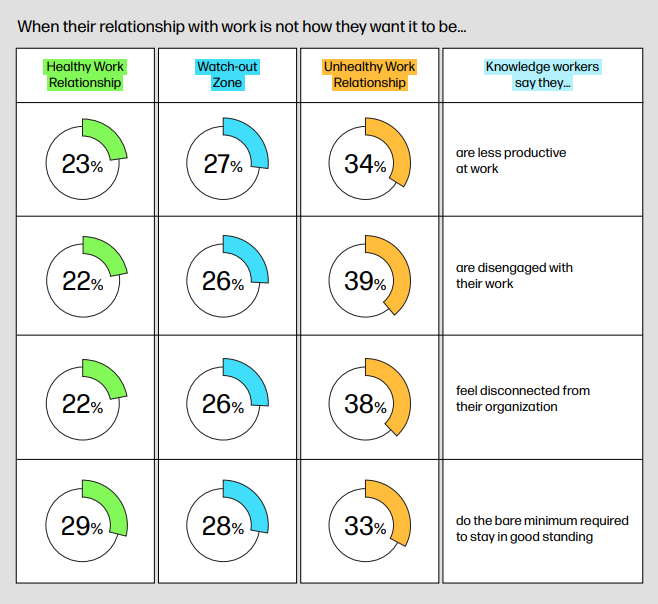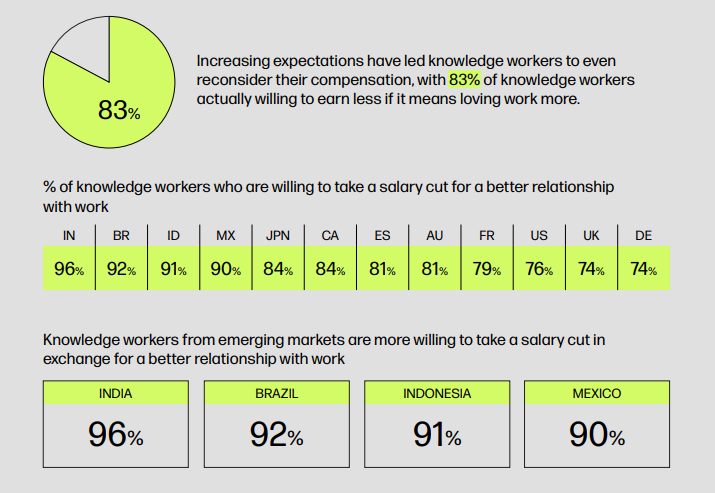HP: 8 in 10 would take a pay cut for a better workplace experience
The tech giant’s CPO shares exclusive insights with UNLEASH.
News In Brief
One in three employees have an unhealthy relationship with work, and this is impacting business bottom lines.
That's according to new global data from tech giant HP.
What's the solution? HP's CPO shares all with UNLEASH.
Just one in four (27%) of global workers have a healthy relationship with their work. This drops to a shocking 5% in Japan, according to new research by HP.
In fact, the survey of 5,000 global leaders and workers found that a higher proportion (32%) describe their relationship with work as unhealthy.
These findings shocked the HP team when they looked at the data – as HP’s chief people officer Kristen Ludgate exclusively tells UNLEASH.
The data is a real wake-up call – the report found that these unhealthy relationships are having a significant negative impact on employees’ wellbeing.
62% felt their physical health had declined, and 55% were struggling with their mental health as a result.
48% felt emotionally or physically drained in their personal lives as a result of their experience at work.
This led to 45% feeling they couldn’t invest in themselves or their relationships, and 59% becoming disinterested in their life outside work, including their hobbies.
All of this is very bad news, but these unhealthy relationships aren’t just having a personal impact on employees, they are also impacting business bottom lines.
HP’s research showed that their productivity, engagement, connection at work were impacted.
As a result of their bad relationships with their work, they were doing the bare minimum and 73% were considering quitting their job.

Credit: HP, Work Relationship Index.
Better leaders are key to employee experience
Clearly, this is situation is untenable – talent is key to organization’s success, and bottom lines rely on happy, productive workers.
Now is a pivotal moment for organizations to really focus on creating a better employee experience, and higher workplace satisfaction.
In fact, HP’s research shows that 83% of employees would be willing to take a pay cut if it meant they would love their job.
They would be willing to give 13% of their salary to work where they want or when they want, and 11% to work somewhere with a higher-than-average employee engagement.

Credit: HP, Work Relationship Index.
But this begs the question: What actions should organizations take to achieve this?
HP found six key areas for organizations to prioritize – fulfillment, leadership, people-centricity, skills, tools and workspace.
HP’s Ludgate tells that focusing on these areas is a “‘win-win’ employers and employees, leading to more productive, healthier work experiences. But, to get there we need to listen and work together”.
She particularly picks out the need for leaders to “emphasize putting people first [and] involving them in their decision-making”.
Emotional intelligence must be the future of leadership (70% of business leaders acknowledge this, but only 40% of workers see success here and 66% would consider a pay cut to work somewhere with emotionally intelligent leaders).
Plus employers need to prioritize the right technology, equipment and workspace – 73% of workers value this, but only 26% are currently having the right digital experience at work.
“No longer just a utility, the tech portfolio is emerging as a key driver of connection, enablement, flexibility and autonomy in the workplace,” concludes Ludgate.
Employee experience at UNLEASH World
UNLEASH World is coming up in Paris in just two weeks!
Don’t miss out on this opportunity to hear from Fosway, L’Oréal, Sanofi, Deloitte (and many more) about how to drive top-notch, people-centric employee experiences in your organization.
It’s not too late to grab your ticket for the Paris show.
Sign up to the UNLEASH Newsletter
Get the Editor’s picks of the week delivered straight to your inbox!

Chief Reporter
Allie is an award-winning business journalist and can be reached at alexandra@unleash.ai.
Contact Us
"*" indicates required fields
Partner with UNLEASH
"*" indicates required fields